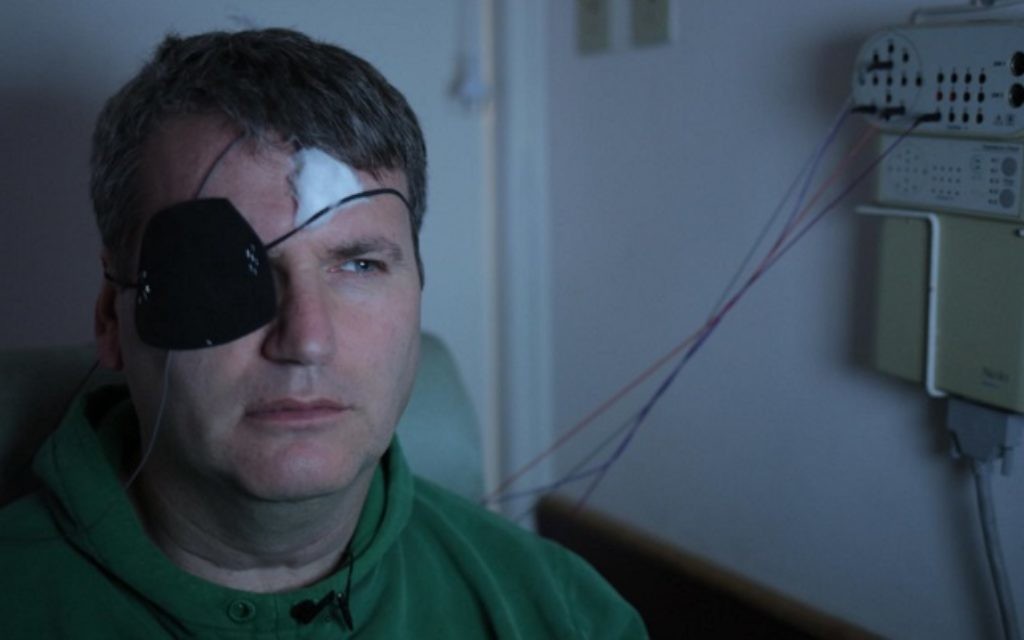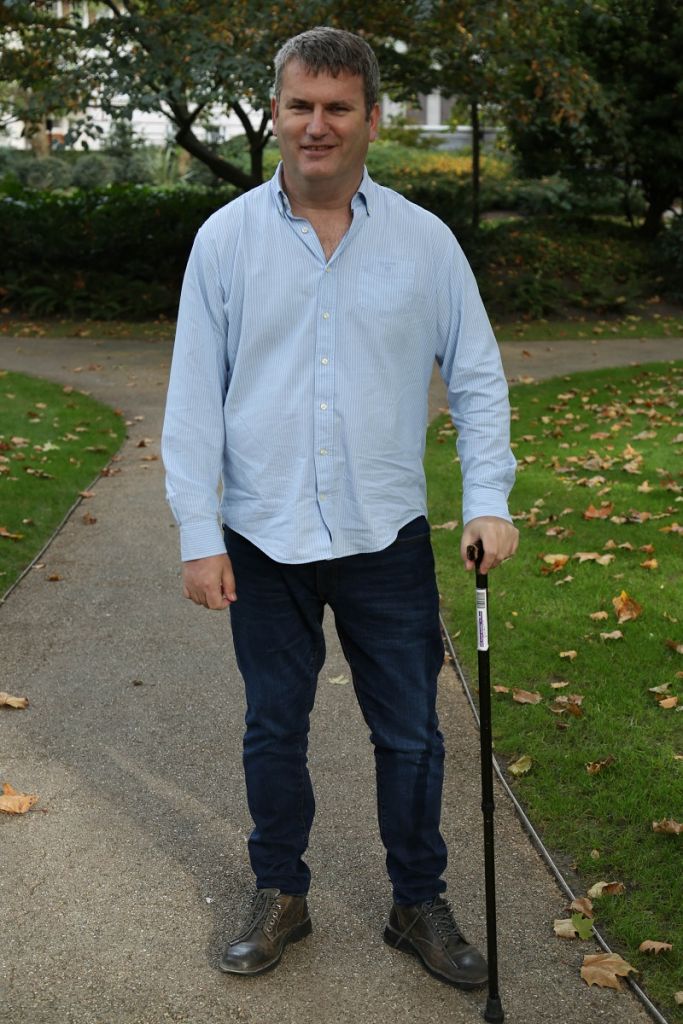Miracle in Jerusalem? Mark Lewis seeks out a revolutionary MS cure
Channel 4's The Search For A Miracle Cure follows multiple sclerosis sufferer Mark as he takes part in a unique stem cell trial

While not someone who describes himself as religious, Mark Lewis found himself struck by the “prophetic” words of a famous psalm.
“If I forget thee, O Jerusalem, let my right hand wither,” he recalls. “That was interesting, because in many ways my right hand had withered – but then I went to Jerusalem to get it fixed.”
Lewis recently became Patient 31 out of 48 in a clinical trial held at Hadassah University Medical Center to test a revolutionary stem cell treatment for multiple sclerosis (MS).
Get The Jewish News Daily Edition by email and never miss our top stories Free Sign Up
Supported by his partner Mandy, his quest to discover whether there is light on the horizon for this degenerative condition is the subject of a thought-provoking documentary, The Search For A Miracle Cure, which airs on Channel 4 tonight.
In his working life, 52-year-old Lewis is the internationally-renowned lawyer who represented Milly Dowler’s family and more than 180 victims in the News of the World hacking scandal.
But where he has triumphed in the courts, Lewis has yet to conquer his MS, a debilitating condition that affects the central nervous system and for which there is currently no cure.
The Manchester-born media, libel and privacy lawyer was formally diagnosed aged 25, but had begun displaying symptoms while a young child.
“My doctor actually thought it might be a possibility when I was eight-years-old,” reveals Lewis, a former BBYO north regional president. “As a child, I had pins and needles and numbness in my leg.
“By the time I was 25, I had the feeling of a wasp sting in my right wrist, which was always there.
“When I was first told the news, I tried to ignore it. Someone at work, whose husband is a doctor, advised that it would be best not to mention my condition, so that people would see me for who I am rather than someone with a disability.”
He modestly admits to “making wonderful achievements”, among them taking on the News of the World and the Mirror Group, as well as being the only solicitor in private practice mentioned in the Evening Standard’s list of 1,000 most influential Londoners.
But the stress of his high-powered career has taken its toll and in recent years his health has deteriorated, so Lewis was more than interested to see if the medical team at Hadassah could offer a breakthrough treatment.
Led by Professor Dimitrios Karussis, the trial involves taking stem cells from a patient, cloning them, fixing the defect thought to cause MS and then injecting the cells back into the patient.

Each patient receives two injections, although it is not known by either the patient or the doctor if these contain the real treatment or a placebo.
For Lewis, the trial was all the more momentous because it was “available to everybody” and incorporated the skills of a Greek Christian doctor and an Arab Israeli scientist controlling the trial.
“Not one person involved in the trial ever asked if I am Jewish,” he adds. “It simply didn’t matter to them. You have a Christian doctor, guided by a Muslim scientist, treating a Jewish patient. The team were not interested in religion, they were simply there to help treat us.
“One of the patients was a Muslim woman from Hebron, who claimed the treatment was miraculous. She was in a wheelchair, but now she can walk again.”
When the day came for Lewis to receive his first injection, unfortunately the procedure did not go as smoothly as planned, and the film shows his visible discomfort.
“It was honestly the most painful thing I’ve ever done,” he confesses. “The footage is edited down from over an hour of injection after injection.
“At one point, they had done 20 injections into my spine and I was prepared to give up. I was thinking I would rather have MS.”
But then something truly remarkable happened. At the beginning of the documentary, the leading lawyer was unable to walk long distances and needed Mandy to help him get dressed.
Just two hours after the first injection, Lewis had improved mobility in his legs and was able to shake hands using his right hand – a gesture he claims is “something I would never have done”.
“Although Jerusalem is pretty good at miracles, I believe this was all to do with the treatment,” reflects Lewis.
“I used to shake hands with people using my left hand, turning it upside down to shake their hand. I have so little control over my own right hand.
“And I was able to walk and didn’t even hold onto the walls or anything. I don’t believe it was all in my mind.
“Although Jerusalem is pretty good at miracles, I believe this was all to do with the treatment”
“There was a marked physical improvement. Believe me, if you could will yourself better, then I would be better.”
For Lewis, the physical changes were all the more pronounced when he returned for a second treatment – and found there was no immediate change at all.
The trial has now ended and he is yet to discover if he was given the real treatment on at least one occasion, but there is little doubt in Lewis’ mind that it produced a “wonderful effect”.
Although the effects have worn off, there is still noticeable improvement. The “wasp sting” feeling in his wrist that Lewis has lived with since he was 25 has disappeared.
Does Lewis believe one day a cure will be found for MS? “Absolutely,” he asserts without hesitation.
“In the 1920s if you went to the doctor and were told you had diabetes, you would expect to die, because artificial insulin was not invented then.
“Today, it’s a condition that can be quite clearly controlled. Every disease in the world is just awaiting a cure.”
The Search For A Miracle Cure airs tonight, 10pm, on Channel 4

Thank you for helping to make Jewish News the leading source of news and opinion for the UK Jewish community. Today we're asking for your invaluable help to continue putting our community first in everything we do.
For as little as £5 a month you can help sustain the vital work we do in celebrating and standing up for Jewish life in Britain.
Jewish News holds our community together and keeps us connected. Like a synagogue, it’s where people turn to feel part of something bigger. It also proudly shows the rest of Britain the vibrancy and rich culture of modern Jewish life.
You can make a quick and easy one-off or monthly contribution of £5, £10, £20 or any other sum you’re comfortable with.
100% of your donation will help us continue celebrating our community, in all its dynamic diversity...
Engaging
Being a community platform means so much more than producing a newspaper and website. One of our proudest roles is media partnering with our invaluable charities to amplify the outstanding work they do to help us all.
Celebrating
There’s no shortage of oys in the world but Jewish News takes every opportunity to celebrate the joys too, through projects like Night of Heroes, 40 Under 40 and other compelling countdowns that make the community kvell with pride.
Pioneering
In the first collaboration between media outlets from different faiths, Jewish News worked with British Muslim TV and Church Times to produce a list of young activists leading the way on interfaith understanding.
Campaigning
Royal Mail issued a stamp honouring Holocaust hero Sir Nicholas Winton after a Jewish News campaign attracted more than 100,000 backers. Jewish Newsalso produces special editions of the paper highlighting pressing issues including mental health and Holocaust remembrance.
Easy access
In an age when news is readily accessible, Jewish News provides high-quality content free online and offline, removing any financial barriers to connecting people.
Voice of our community to wider society
The Jewish News team regularly appears on TV, radio and on the pages of the national press to comment on stories about the Jewish community. Easy access to the paper on the streets of London also means Jewish News provides an invaluable window into the community for the country at large.
We hope you agree all this is worth preserving.
-
By Laurent Vaughan - Senior Associate (Bishop & Sewell Solicitors)
-
By Laurent Vaughan - Senior Associate (Bishop & Sewell Solicitors)
-
By Laurent Vaughan - Senior Associate (Bishop & Sewell Solicitors)
-
By Laurent Vaughan - Senior Associate (Bishop & Sewell Solicitors)





















